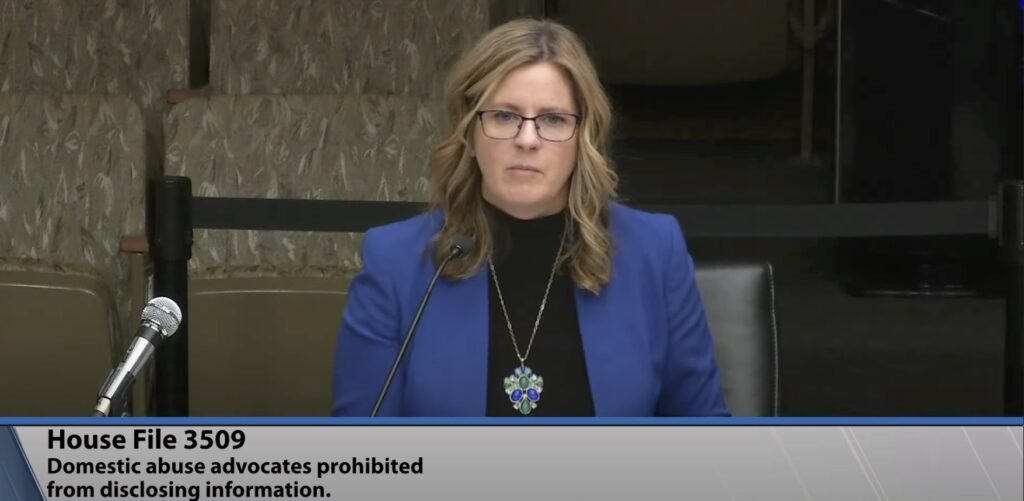House committee discusses legal privileges and privacy for domestic abuse advocates and victim-survivors: Notes from Feb. 15 Public Safety Finance and Policy Committee
Notes by Cirien Saadeh, Executive Director and Community Journalist

Feb. 15 meeting of the House Public Safety Finance and Policy committee
HF3509 (Moller) Domestic abuse advocates prohibited from disclosing information.
Rep. Kelly Moller (40A) moves for House File 3509 to be re-referred to the Judiciary and Civil Law committee.
No amendments filed.
Rep. Moller describes the bill
- “This is an issue related to victim privilege, victim privacy. I could talk for hours about this issue because it is something that I worked on for over a decade. There is a privilege in statute that applies to a lot of different communications that we as a state want to protect. We want people to be able to say things in confidence because those conversations are super-helpful. Attorney-Client privilege is the first thing that comes to mind, everybody’s heard of that. Everybody’s aware of the medical privilege you have with your medical providers, mental health providers. But we also have in statute privileges for the communications between a sexual assault advocate and a victim-survivor and a domestic violence advocate-victim survivor. For some reason the statute has some disparities with regards to how protective that privilege is for domestic violence as opposed to those other privileges including sexual assault and so this is really trying to close what I consider is a loophole in that statute and make sure that domestic violence advocates and survivors have that same level of privilege.”
Public Testimony
Rana Alexander, Director of Finance for Standpoint
- “Domestic violence is an under-reported crime and among the many reasons that victims give for not seeking or reporting for help is the loss of anonymity and privacy that comes with engaging the criminal justice system. Working with an advocate can provide a safe, confidential, and non-judgmental opportunity for a victim of domestic violence to consider all the various options while addressing any pressing needs including crisis support and access to services while responding to the trauma they have experienced.”
- “In 2008, the Minnesota Legislature without a single no-vote or any objection recognized that the public interest in domestic violence victims’ health and safety rises to the level of justifying the creation of a specific privilege protecting confidential information. We are now asking the legislature to update the statute to bring it in-line with the sexual assault counselor privilege.”
- “Victim-survivors often express a feeling of being re-victimized by the system when their records from a domestic violence program are sought. Domestic violence victims expect and have the right to expect that they sought help from a domestic violence program will not become known outside that agency. They expect and have the right to expect the type and extent of services that they will need will remain confidential and private between them and the agency. Victim-survivors have the right to expect one thing: confidential, private help with the domestic violence they have experienced. Federal and state law support that expectation and Minnesota’s domestic abuse advocate privilege needs to be amended so we can honor that right to privacy.”
Andrew Morris, Public Affairs Legislative Liaison for the Council on Asian Pacific Minnesotans
- “Domestic violence remains a priority within Minnesota’s API communities, with survivors often reaching out for help to community-based organizations due to the cultural and linguistically – relevant services that only they could provide. This is particularly true in our new arrival communities. Community-based domestic abuse advocacy programs play an indispensable role in advocating and guiding survivors. The bedrock of their work is their ability to build a relationship based on understanding and trust. This legislation would strengthen that foundation and allow survivors of domestic abuse to have the confidence that, in their most vulnerable moments, they can seek the assistance they need from community advocates for help in achieving emergency shelter, crisis intervention, and other supports and information, they can assist them in reaching a safe environment.”
Member Discussion
Rep. Paul Novotny (30B)
- “I encourage our members to vote green.”
Closing Comments from Rep. Moller
- No closing comments
Vote
Rep. Moller renews the motion that House File 3509 be re-referred to the House Judiciary Finance and Civil Law committee.
All legislators vote aye.
